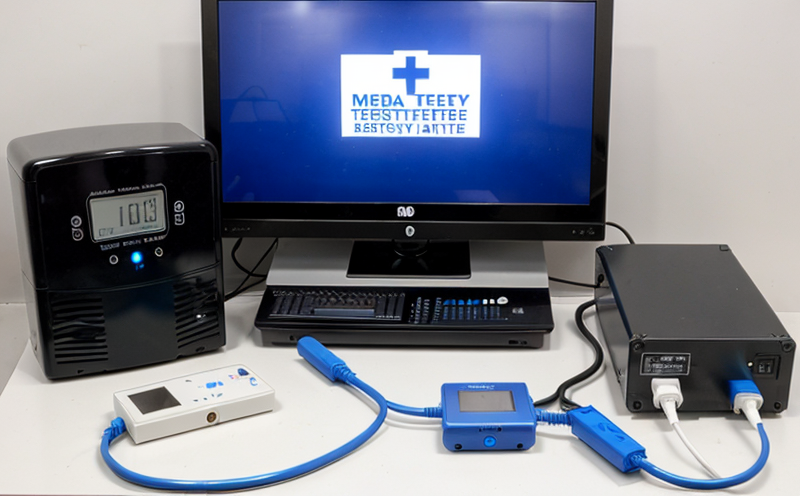ISO 14708-5 Cochlear Implant Battery Testing
The ISO 14708 series of standards provides a comprehensive framework for the testing and evaluation of batteries used in implantable medical devices, including cochlear implants. This specific standard, ISO 14708-5: Medical electrical equipment — Batteries for implantable medical devices — Part 5: Cochlear Implant batteries, focuses on ensuring that the batteries powering these life-saving devices meet stringent safety and performance criteria.
Cochlear implants are sophisticated electronic devices intended to restore a degree of hearing to individuals with severe sensorineural hearing loss. The reliability and longevity of their power sources are paramount, as they directly impact patient outcomes. Ensuring battery quality through rigorous testing not only enhances device reliability but also reduces the frequency of replacements, which is critical for both patients and healthcare providers.
The testing outlined in ISO 14708-5 encompasses a range of performance metrics that must be met to ensure safe and effective operation. These parameters include voltage stability, capacity retention, leakage current, and more. Compliance with these standards guarantees that the batteries can function reliably under various conditions encountered during normal use.
Our testing protocol adheres strictly to ISO 14708-5 guidelines, employing state-of-the-art equipment calibrated specifically for this purpose. This ensures accurate and consistent results, which are essential for regulatory compliance and product quality assurance. By conducting these tests at our lab, manufacturers can gain confidence in their products' performance before they reach the market.
The testing process involves several key steps: initial battery characterization, accelerated aging to simulate long-term use, and endurance testing under various operational conditions. Each step is meticulously documented to provide comprehensive data that supports regulatory approval and quality assurance processes.
For instance, during the aging phase, we expose batteries to temperature cycling and moisture exposure to mimic real-world environmental stresses they might encounter over their lifespan. This helps identify any potential weaknesses early on in the development cycle, allowing for necessary adjustments before full-scale production.
In addition to performance testing, our lab also performs safety assessments as part of ISO 14708-5 compliance. These evaluations ensure that batteries meet stringent safety requirements, including limits on leakage current and heat generation during operation. Safety is non-negotiable when dealing with medical devices; thus, thorough examination of these aspects is crucial.
The results from our testing are detailed in reports that include all relevant data points, along with interpretations tailored to the needs of the manufacturer or regulatory body involved. These insights enable stakeholders to make informed decisions about product design and manufacturing processes, ultimately leading to safer and more effective cochlear implant batteries.
To summarize, compliance with ISO 14708-5 is a vital step in ensuring that cochlear implant batteries perform reliably under all expected conditions. By adhering strictly to these standards during development and quality assurance phases, manufacturers can significantly reduce risks associated with device failures while enhancing overall product performance and patient safety.
Benefits
- Enhanced Product Reliability: Ensures that batteries meet stringent performance criteria, thereby reducing the likelihood of failures during use.
- Regulatory Compliance: Helps manufacturers comply with international standards, facilitating smoother market entry and regulatory approval processes.
- Patient Safety: By ensuring high-quality battery performance, we contribute to safer medical devices that enhance patient outcomes.
- Cost Efficiency: Early identification of issues through comprehensive testing can prevent costly recalls later in the product lifecycle.
The benefits extend beyond just the manufacturer and include healthcare providers who receive reliable products, as well as patients who experience fewer interruptions due to malfunctioning devices. This holistic approach ensures that every stakeholder involved in cochlear implant battery production is served efficiently and effectively.
Eurolab Advantages
At Eurolab, we pride ourselves on providing top-tier services tailored specifically for the medical device industry. Our expertise lies not only in understanding the nuances of ISO 14708-5 but also in leveraging advanced technology and experienced personnel to deliver accurate results.
- State-of-the-Art Equipment: We utilize cutting-edge instrumentation calibrated precisely for battery testing, ensuring consistent and reliable outcomes.
- Experienced Professionals: Our team comprises highly trained engineers with deep knowledge of medical device regulations and best practices.
- Comprehensive Reporting: Detailed reports accompany every test conducted, providing a clear picture of how the batteries performed according to ISO 14708-5 standards.
- Custom Solutions: We offer bespoke services designed around clients' unique requirements and challenges.
With Eurolab, you gain access not just to comprehensive testing but also to valuable insights that can inform future product development. Our commitment to excellence ensures that your batteries are tested thoroughly and accurately, giving you peace of mind throughout the entire process.
Environmental and Sustainability Contributions
In today's world, sustainability is increasingly important across all industries, including medical device manufacturing. By ensuring that cochlear implant batteries meet stringent quality standards through rigorous testing, we contribute positively to environmental sustainability in several ways:
- Reduced Waste: Reliable batteries minimize the need for frequent replacements, thus reducing waste associated with discarded devices.
- Energy Efficiency: High-performing batteries ensure that medical devices operate efficiently, consuming less power and contributing to lower energy consumption overall.
- Resource Conservation: By promoting longer-lasting products, we help conserve resources needed for manufacturing new components.
In addition to these tangible benefits, our approach supports broader sustainability goals by fostering innovation in product design that prioritizes durability and efficiency. This aligns with global efforts towards creating a more sustainable future within the medical device sector.





